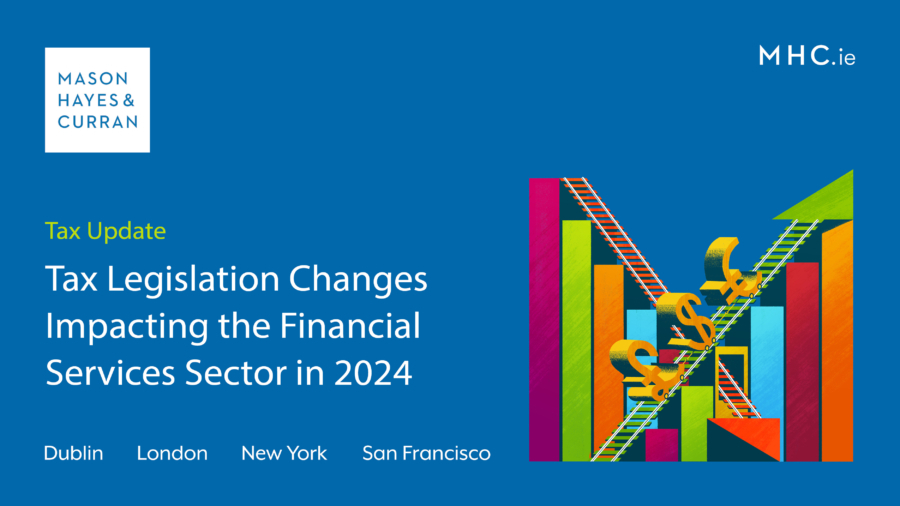
The Finance Act (No.2) 2023 introduced several important changes to Irish tax legislation, including changes to integrate policies that have been driven at an EU and OECD level. Our Tax team examines the scope of the most significant changes that businesses should be aware of for the coming year and beyond, in particular, measures that impact the financial services sector.
Pillar Two
Perhaps the biggest talking point from The Finance Act (No.2) 2023 for companies generally is its transposition of the EU Minimum Tax Directive 2022 (the Directive). This Directive introduced a framework for the implementation of the OECD Pillar Two agreement, known as the Global Anti-Base Erosion (GloBE) rules. The GloBe rules provide for a global minimum effective tax rate (ETR) of 15% on profits for businesses that have an annual group / global turnover in excess of €750 million and are relevant to the very largest multinational and domestic businesses that meet this threshold in at least two of the preceding four years. They come into effect for in-scope businesses with accounting periods beginning on or after 31 December 2023.
In implementing the Directive, Ireland has elected to introduce a top-up tax, known as a QDTT under the Pillar 2 rules, which allows in-scope entities to pay additional tax in Ireland to bring their effective tax rate up to the 15% global minimum standard. This means that in-scope Irish-based group entities will pay a top-up tax to the Irish Exchequer, rather than to a tax authority outside of Ireland.
There are certain exclusions from the rules for “investment entities” including certain investment funds, real estate investment vehicles and insurance investment entities (as defined in the Act) that meet certain conditions, but clients should consider the rules in detail to determine whether the exclusions might apply or whether they fall within the scope of the new rules. In-scope clients will need to evaluate the potential impact of these rules, not just on their tax position but also on their compliance processes and systems.
Outbound payments
The Finance Act (No.2) 2023 introduces new anti-avoidance measures aimed at the payment of interest, royalties or distributions to associated entities / companies located in no-tax or zero-tax rate countries or countries that are on the EU non-cooperative list. These provisions are designed to prevent so-called “double non taxation”. This is an exemption from Irish withholding tax on payments which are not taxed in the hands of associated group companies due to the local tax rules in the relevant recipient country.
The new provisions do this by disallowing the usual exemptions from withholding tax on these payments from 1 April 2024. In the case of distributions caught by this new rule, they will be subject to Irish withholding tax generally where the income, profits or gains from which the distribution is made were not subject to taxation.
These new rules will impose a reporting obligation on the payor of interest, royalties or distributions for certain pre-existing arrangements from 1 January 2025. Where relevant, these provisions may have a significant impact on inter-group financing and clients may wish to consider potential re-structuring options.
Qualifying financing company
On a positive note, The Finance Act (No.2) 2023 introduces a new measure providing for interest tax deductibility for a “qualifying financing company”. A “qualifying financing company” is a company which raises third party finance for the purposes of on-lending those funds to a qualifying subsidiary for that subsidiary’s trade. This is a welcome change which should assist financing and leasing operations, though its impact may be limited given the requirement for the finance to come from third party sources.
Leasing
There have been several technical amendments introduced by The Finance Act (No.2) 2023 relating to the taxation of leases following stakeholder involvement with Revenue and the Department of Finance over the last number of years. Some of the amendments include:
- Confirmation that in calculating the profits of a trade of leasing for a lessor, the income of a lessor from a finance lease is generally to be treated as arising evenly over the life of the lease, irrespective of how the transaction is recorded in a company’s accounts
- Certain technical amendments have been made to ensure the legislative provisions operate as intended, including around the claiming of capital allowances on the leasing of plant and machinery and the claiming of capital allowances by lessees, and
- Confirmation that companies carrying on a leasing activity within the charge to corporation tax under Schedule D Case IV shall not be precluded from claiming a deduction for yearly interest
Many of the changes introduced by The Finance Act (No.2) 2023 are welcomed but certain amendments are complex, and we would advise clients to consider carefully how they might be impacted by these changes.
Bank levy
A revised bank levy will apply for 2024 payable by banks which received State assistance during the banking crisis. It will be applied at the rate of 0.112% of the value of eligible deposits held by each bank on 31 December 2022 (the relevant base year is 2022 for 2024).
Stamp duty
The Finance Act (No.2) 2023 provides for an exemption from stamp duty on electronic transfers of Irish shares listed on a recognised stock exchange located in the US or Canada where the trade is settled through a securities settlement system located in the US or Canada. This treats such transactions as exempt on the same basis as American depository receipts (ADRs), putting an existing Revenue administrative practice on a statutory footing.
Distributions to non-resident pension schemes
Helpfully, amendments have been made in The Finance Act (No.2) 2023 to align dividend withholding tax (DWT) and related income tax rules with EU law, including extending the exemption from DWT and income tax to pension funds located in a country with which Ireland has a Tax Information Exchange Agreement.
Revenue compliance changes
The Finance Act (No.2) 2023 introduces a significant change to the taxation of share option schemes relevant to all companies providing this form of employee share incentive. Employers are obliged to operate income tax, USC and PRSI on share option gains through the real-time PAYE system and to report on the exercise and/or grant of share options from 1 January 2024. This change is likely to result in a significant burden for affected employers operating existing share option schemes this year and beyond.
In addition, new rules on the enhanced reporting of employee benefits by employers, which were legislated for in the Finance Act 2022, have come into effect from 1 January 2024. This represents an additional unwelcome compliance burden for employers who will need to familiarise themselves with the new rules and ensure their internal procedures comply with these requirements.
The Act makes amendments to the legislation relating to FATCA, CRS and DAC2, confirming that in the case of reporting financial institutions that are structured as trusts or partnerships, penalties for non-compliance may be applied to the liable person, such as the precedent partner in a partnership or the trustees or management company of a trust (for trusts that are investment undertakings).
Separately, another important change introduced by the Act is the possibility of a joint audit by the Revenue Commissioners and a tax authority of another EU Member State. Upon request by the other tax authority, Revenue may authorise a foreign tax official to be a ‘nominated officer’ for the purposes of a joint audit only. There are detailed measures in The Finance Act (No.2) 2023 in this regard, and we would recommend that clients engaged in cross-border activities should familiarise themselves with these measures.
Ones to watch
It is worth nothing two other material developments in Irish tax on the horizon, namely a proposal to bring in a dividend participation exemption and new country-by-country reporting requirements.
A participation exemption for inbound dividends will be introduced in 2024. Adoption of a full dividend participation exemption regime in line with other EU and OECD countries is envisaged. This would represent a significant improvement in Ireland’s competitiveness and its attraction as a holding company jurisdiction.
The EU (Disclosure of income tax information by certain undertakings and branches) Regulations 2023, commonly referred to as public country-by-country, or CbC tax reporting obligations will apply from 22 June 2024. This means that corporate groups with an annual turnover of €750 million or more in each of two consecutive financial years will be obliged to publish certain information if they are either EU-parented or otherwise have EU subsidiaries or branches of a certain size. The report must include information on all members of the group (i.e. including non-EU members) and contain certain tax and other financial information about the activities performed in each country. However, importantly, the CbC reporting obligations will not apply to groups operating solely within a single EU Member State or to Irish branches where the net turnover does not exceed €12 million in the preceding two consecutive financial years.
For more information and expert advice on understanding and navigating the potential impact of these changes in 2024, contact a member of our Tax team.
The content of this article is provided for information purposes only and does not constitute legal or other advice.








